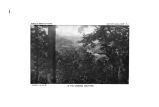| OCR Text |
Show MOONEY] WILLIAM H. THOMAS K> 1 Indians, and Thomas's mother soon after removed from Waynesville to a farm which she purchased on the west bank of Oconaluftee, opposite the mouth of Soco, where her son went to live with her, having now set up in business for himself at Qualla. Yonaguska and his immediate connection continued to reside on a small reservation in the same neighborhood, while the rest of the Cherokee retired to the west of the Nantahala mountains, though still visiting and trading on Soco. After several shiftings Thomas finally, soon after the removal in 183S, bought a farm on the northern bank of Tuckasegee, just above the present town of Whittier in' Swain county, and built there a homestead which he called Stekoa, after an Indian town destroyed by Rutherford which had occupied the same site. At the time of the removal he was the proprietor of five trading stores in or adjoining the Cherokee country, viz, at Qualla town, near the mouth of Soco creek; on Scott's creek, near Webster; on Cheowa, near the present Robbins-ville; at the junction of Valley river and Hiwassee, now Murphy; and at the Cherokee agency at Calhoun ( now Charleston), Tennessee. Besides carrying on a successful trading business, he was also studying law and taking an active interest in local politics. In his capacity as agent for the eastern Cherokee he laid off the lands purchased for them into five districts or " towns," which he named Bird town, Paint town, Wolf town, Yellow hill, and Big cove, the names which they still retain, the first three being those of Cherokee clans. 1 He also drew up for them a simple form of government, the execution of which was in his own and Yonaguska's hands until the death of the latter, after which the band knew no other chief than Thomas until his retirement from active life. In 1848 he was elected to the state senate and continued to serve in that capacity until the outbreak of the civil war. As state senator he inaugurated a system of road improvements for western North Carolina and was also the father of the Western North Carolina Railroad ( now a part of the Southern system), originally projected to develop the copper mines of Ducktown, Tennessee. With his colleagues in the state senate he voted for secession in 1861, and at once resigned to recruit troops for the Confederacy, to which, until the close of the war, he gave his whole time, thought, and effort In 1862 he organized the Thomas Legion, consisting of two regiments of infantry, a battalion of cavalry, a company of engineers, and a field battery, he . himself commanding as colonel, although then nearly sixty years of age. Four companies were made up principally of his own Cherokee. The Thomas Legion operated chiefly as a frontier guard 1 In the Cherokee language Taiskwa/ hl, *• Bird place," Ani'- Wa'dihl," Paint place," Wa'ya'hl, " Wolf place," Blawa'dl, " Red earth" ( now Cherokee post- office and agency), and Kalanufi'yl, " Raven place." There was also, for a time, a •* Pretty- woman town " ( Ani'- Gila'hl?). 19 ETH- 01 11 |































































































































































































































































































































































































































